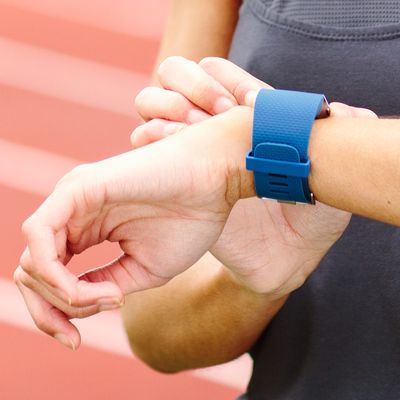
This news may upset some people who’ve placed their trust in technology, so take a deep breath: A new study found that overweight people following the same diet lost less weight over a two-year period if they used a fitness tracker compared to people who didn’t have one.
For a new paper in JAMA, the Journal of the American Medical Association, researchers from the University of Pittsburgh recruited 470 overweight or obese people between 18 and 35. Everyone was placed on a low-calorie diet and told to increase their physical activity; they also had group counseling sessions. After six months, half of the participants were randomly assigned to a group that would monitor diet and activity online, and the other half received a fitness tracker (a BodyMedia Fit Core armband) that had an external display and a web interface.
About 75 percent of the subjects, or 350 people, completed the two-year study. After those two years, including 18 months with or without a tracker, people in the “standard” weight-loss group had lost an average of 13 pounds (about 210 at the start versus 197 at the end) while people in the “technology-enhanced” group lost about 7.7 pounds (212.3 down to 204.5). The people given trackers had a slightly higher starting weight, but the researchers calculated percentage of weight loss and the people in the tracker group still didn’t lose as much as the other group.
Both groups saw improvements in body composition, diet, and physical activity and the differences were not statistically significant, so the authors said the reason for the varying weight loss between the groups warrants further study. Though lead author John Jakicic, Ph.D., said in a release that trackers “may give people somewhat of a false sense of security that they don’t pay attention to some of the key behaviors that they otherwise might to pay attention to. They are relying on the device or the technology a little bit too much and that may be why we saw a little bit less weight loss in that group.” Like not focusing on their sleep, or seeing how much they’re working out and possibly eating and sitting a little more.
There are some limitations to the study, namely that participants didn’t start tracking their activity until six months in. The trackers given to half the group were also worn on the upper arm versus on the wrist like contemporary devices (the study was conducted between October 2010 and October 2012). It’s possible that people would have worn on-wrist trackers more often — the median number of days people wore the Fit Core was 170, or less than every third day of the 18 months they had them. But it’s not clear if that would have helped them drop more weight.




